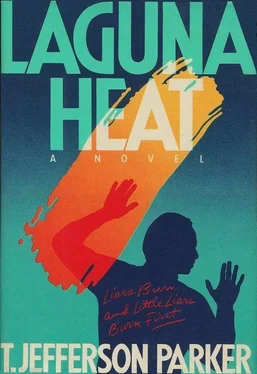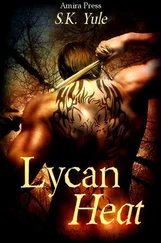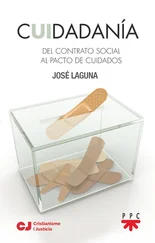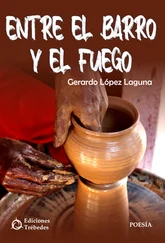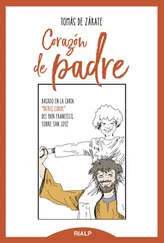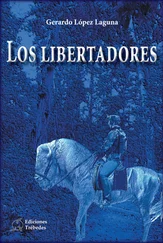He studied the box. “How about the diary, Dorothea? May I see that too?”
She shook her head gravely. “I’m sorry, but Hope’s desire is that the diary remain sealed until five years after her death. It’s a matter of—”
Shephard brought out his badge. “I forgot to mention, Dorothea, that this is police business.”
She nodded, brows furrowing. A moment later she was back with a heavy, leather-bound book.
He felt like the prisoner of an overly kind aunt, but the feeling was not altogether unpleasant. She brought him a cup of instant coffee so strong that it was undrinkable, so hot that the plastic spoon had wilted into uselessness. He thanked her profusely, smiling as she hobbled off to the front room cinching the bright sweater around her neck.
The box contained newspaper clippings taped to notebook paper. The articles were yellowed and weakened by time, and the tape had collected a dark residue of dust around its edges. But each sheet was dated in the upper right corner, and they were arranged chronologically. Shephard set the stack on the couch beside him, glanced at the vile coffee, and started at the beginning.
Hope Augustine had first surfaced in the press in 1943, when she was pictured in the Laguna Week News as one of several local women honored for her work with the Red Cross. She was third from the left in the group shot, a dreamy smile on her face, her hair held severely back with a clip. The article said that she had recently returned from service overseas. Later that year she was again pictured in the Laguna Week News, this time for organizing a volunteer support group for the South Laguna Hospital. The group called themselves the Angelitos — Little Angels — and the other women were like Hope Augustine: young, pretty, happy. They had dedicated themselves to outpatient care and fund raising. Hope was president. She was quoted succinctly in the short article: “I think work like this is the least we can do in wartime.”
A year later she was pictured in the engagements column of the same paper. Her betrothed was Burton Creeley, an accountant and partner in the newly formed Surfside Sail and Tennis Club in Newport Beach.
No wonder she was a member, Shephard thought. Had she known Tim Algernon then?
Apparently, Hope Augustine had become Hope Creeley and moved to Newport Beach, five miles north of Laguna on the same unspoiled coast. The Newport Ensign picked up her story again in late 1944, when she was pictured as the new bride of businessman Creeley. He was beside her in the wedding shot, a frail, dapper man who was five years her senior. The couple appeared regularly through 1944 and 1945, favorite targets of party-going photographers. They were pictured aboard yachts, at ground-breaking ceremonies for additions to the Surfside Club, in tennis garb at post-tournament parties. One photograph was similar to the one he’d seen in Creeley’s house: Hope and Burton standing on the Surfside court, a trophy at their feet. The happy couple continued their public lives through the forties, always surrounded by the postwar gaiety and newfound opulence of the Surfside Club.
Then Burton Creeley was dead. An article dated September 26, 1951, said that fishermen had discovered his body dashed against the rocks of the Newport jetty. The next day’s Santa Ana Register said that Creeley was known to swim every evening in the ocean, sometimes in the channel at Newport, sometimes south in Laguna Beach where the currents were known to be treacherous. Burton Creeley was officially classified as the victim of a swimming accident by the Newport Beach Police on September 29.
But on the next day, the Register ran a short article with a large headline, claiming that Creeley had been seen by two friends in Laguna shortly before the accident had taken place. A follow-up story stated that the friends turned out to be two gas station attendants who “believed” they recognized Creeley from newspaper photos. A Newport Beach police captain wryly questioned how a body could wash six miles north, around a jetty, and end up in the Newport Channel in less than a night.
The press lost interest, and Hope Creeley disappeared from the public eye for twenty-four years.
Shephard felt a keen sadness as he looked at the next picture. It was dated November 28, 1975, and showed Hope Creeley, thin and undeniably without happiness, staring back at the photographer. She had organized a support group for the South Laguna Hospital again, and again they called themselves the Angelitos.
Hope Creeley had never looked so far away from heaven, Shephard thought. The women around her were young and vibrant, as she had once been, but Hope Creeley looked pained. Her eyes were still large, but her face had shrunk around them, sagging heavily at the mouth. A year later she was pictured again, this time receiving an award from the hospital’s board chairman, whose beefy grin dominated the one-column shot.
Hope Creeley’s forced and very minor smile was the last one of her public life.
Shephard turned the last clipping onto the pile beside him and lit a cigarette. A sad life and a sadder death, he thought. But why would an avenging God come to make His misery hers? Hadn’t she had enough?
The cigarette tasted raw and bad. He dropped it into an ashtray and watched the smoke lift upward through the stale air. Behind him, from the Historical Society lobby, he heard Dorothea Schilling sneeze, open a drawer, dryly blow her nose. She doesn’t even know yet, he thought.
He hefted the leather-bound diary onto his lap. As he scanned through the book, he saw that the handwriting evolved from a graceful, purposeful flow to a more pragmatic curtness, and finally into wild scribbles that made up the last several entries.
The opening passage was dated January 1952. Four months after her husband’s death, Shephard thought. He felt the pain in her words as he read:
I have fulfilled one half of my New Year’s resolution by beginning this diary, and I’ll fill the other half when I join the Angelitos again. The truth is I’m awfully tired of the support group, even though momma and everyone else tells me to get out of the house and participate. But every time I feel any energy, it takes me back to a time when such things meant something to me. Now, being part of a group is just like taking dead flowers and putting them in the vase I used to put Burt’s roses in. And speaking of that vase, I put it on the kitchen table today and watched the sunlight break through it into a small rainbow. It was lovely but I cried. I feel him everywhere. Mother says I should slowly remove such things from my life and only hold onto the good memories. This seems like good advice, to hold onto only good things. But I’m not sure what to do with the vase. Can good things hurt, too?
Shephard pondered the question respectfully as he turned to the next entry. It was two months later, March 21, 1952:
I’m still having the cramps and jitters inside me. When I think of loving Burt, they get worse and it’s like my mind is trying to forget but my body wants to remember. Sometimes I wake up so hungry for him that my face is wet from tears, and other things are wet too. It isn’t easy for a woman to be alone after being loved by her husband so much. I know that I was not the only woman he made love to, but I know that he never loved her the way he loved me. She is a slut, but I’m not bitter. There is simply no room for bitterness. My heart actually feels like there is something around it, squeezing sometimes. I shopped for two again today, but I felt bad by the time I got to the cereal and had to put my sunglasses on. I still haven’t joined the girls at the hospital yet. But so sweet, some of the letters the patients have written. Maybe when I put some weight back on. Ten pounds down from only a hundred to start with and all the clothes look funny. Still never hungry. It feels so strange when men look at me now.
Читать дальше
